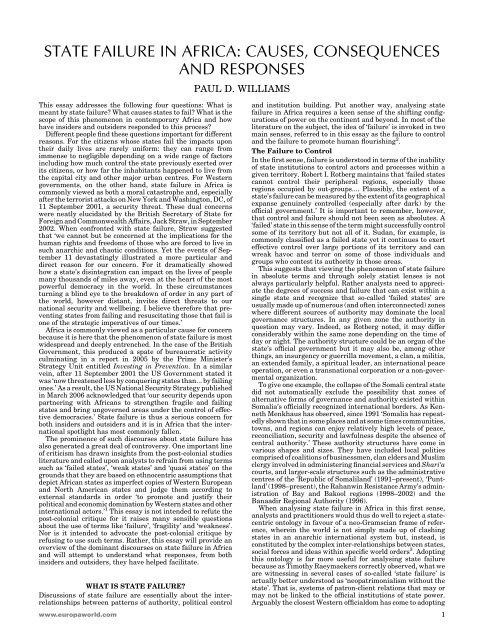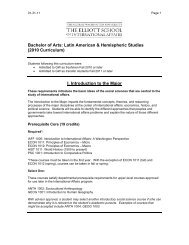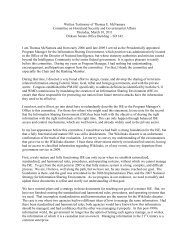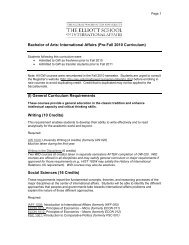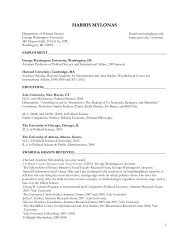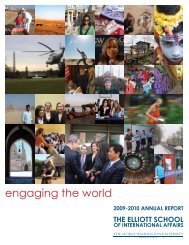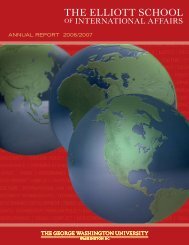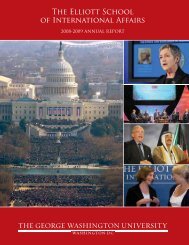state failure in africa: causes, consequences and responses
state failure in africa: causes, consequences and responses
state failure in africa: causes, consequences and responses
You also want an ePaper? Increase the reach of your titles
YUMPU automatically turns print PDFs into web optimized ePapers that Google loves.
STATE FAILURE IN AFRICA: CAUSES, CONSEQUENCES<br />
AND RESPONSES<br />
This essay addresses the follow<strong>in</strong>g four questions: What is<br />
meant by <strong>state</strong> <strong>failure</strong>? What <strong>causes</strong> <strong>state</strong>s to fail? What is the<br />
scope of this phenomenon <strong>in</strong> contemporary Africa <strong>and</strong> how<br />
have <strong>in</strong>siders <strong>and</strong> outsiders responded to this process?<br />
Different people f<strong>in</strong>d these questions important for different<br />
reasons. For the citizens whose <strong>state</strong>s fail the impacts upon<br />
their daily lives are rarely uniform: they can range from<br />
immense to negligible depend<strong>in</strong>g on a wide range of factors<br />
<strong>in</strong>clud<strong>in</strong>g how much control the <strong>state</strong> previously exerted over<br />
its citizens, or how far the <strong>in</strong>habitants happened to live from<br />
the capital city <strong>and</strong> other major urban centres. For Western<br />
governments, on the other h<strong>and</strong>, <strong>state</strong> <strong>failure</strong> <strong>in</strong> Africa is<br />
commonly viewed as both a moral catastrophe <strong>and</strong>, especially<br />
after the terrorist attacks on New York <strong>and</strong> Wash<strong>in</strong>gton, DC, of<br />
11 September 2001, a security threat. These dual concerns<br />
were neatly elucidated by the British Secretary of State for<br />
Foreign <strong>and</strong> Commonwealth Affairs, Jack Straw, <strong>in</strong> September<br />
2002. When confronted with <strong>state</strong> <strong>failure</strong>, Straw suggested<br />
that ‘we cannot but be concerned at the implications for the<br />
human rights <strong>and</strong> freedoms of those who are forced to live <strong>in</strong><br />
such anarchic <strong>and</strong> chaotic conditions. Yet the events of September<br />
11 devastat<strong>in</strong>gly illustrated a more particular <strong>and</strong><br />
direct reason for our concern. For it dramatically showed<br />
how a <strong>state</strong>’s dis<strong>in</strong>tegration can impact on the lives of people<br />
many thous<strong>and</strong>s of miles away, even at the heart of the most<br />
powerful democracy <strong>in</strong> the world. In these circumstances<br />
turn<strong>in</strong>g a bl<strong>in</strong>d eye to the breakdown of order <strong>in</strong> any part of<br />
the world, however distant, <strong>in</strong>vites direct threats to our<br />
national security <strong>and</strong> wellbe<strong>in</strong>g. I believe therefore that prevent<strong>in</strong>g<br />
<strong>state</strong>s from fail<strong>in</strong>g <strong>and</strong> resuscitat<strong>in</strong>g those that fail is<br />
one of the strategic imperatives of our times.’<br />
Africa is commonly viewed as a particular cause for concern<br />
because it is here that the phenomenon of <strong>state</strong> <strong>failure</strong> is most<br />
widespread <strong>and</strong> deeply entrenched. In the case of the British<br />
Government, this produced a spate of bureaucratic activity<br />
culm<strong>in</strong>at<strong>in</strong>g <strong>in</strong> a report <strong>in</strong> 2005 by the Prime M<strong>in</strong>ister’s<br />
Strategy Unit entitled Invest<strong>in</strong>g <strong>in</strong> Prevention. In a similar<br />
ve<strong>in</strong>, after 11 September 2001 the US Government <strong>state</strong>d it<br />
was ‘now threatened less by conquer<strong>in</strong>g <strong>state</strong>s than... by fail<strong>in</strong>g<br />
ones.’ As a result, the US National Security Strategy published<br />
<strong>in</strong> March 2006 acknowledged that ‘our security depends upon<br />
partner<strong>in</strong>g with Africans to strengthen fragile <strong>and</strong> fail<strong>in</strong>g<br />
<strong>state</strong>s <strong>and</strong> br<strong>in</strong>g ungoverned areas under the control of effective<br />
democracies.’ State <strong>failure</strong> is thus a serious concern for<br />
both <strong>in</strong>siders <strong>and</strong> outsiders <strong>and</strong> it is <strong>in</strong> Africa that the <strong>in</strong>ternational<br />
spotlight has most commonly fallen.<br />
The prom<strong>in</strong>ence of such discourses about <strong>state</strong> <strong>failure</strong> has<br />
also generated a great deal of controversy. One important l<strong>in</strong>e<br />
of criticism has drawn <strong>in</strong>sights from the post-colonial studies<br />
literature <strong>and</strong> called upon analysts to refra<strong>in</strong> from us<strong>in</strong>g terms<br />
such as ‘failed <strong>state</strong>s’, ‘weak <strong>state</strong>s’ <strong>and</strong> ‘quasi <strong>state</strong>s’ on the<br />
grounds that they are based on ethnocentric assumptions that<br />
depict African <strong>state</strong>s as imperfect copies of Western European<br />
<strong>and</strong> North American <strong>state</strong>s <strong>and</strong> judge them accord<strong>in</strong>g to<br />
external st<strong>and</strong>ards <strong>in</strong> order ‘to promote <strong>and</strong> justify their<br />
political <strong>and</strong> economic dom<strong>in</strong>ation by Western <strong>state</strong>s <strong>and</strong> other<br />
<strong>in</strong>ternational actors.’ 1 This essay is not <strong>in</strong>tended to refute the<br />
post-colonial critique for it raises many sensible questions<br />
about the use of terms like ‘<strong>failure</strong>’, ‘fragility’ <strong>and</strong> ‘weakness’.<br />
Nor is it <strong>in</strong>tended to advocate the post-colonial critique by<br />
refus<strong>in</strong>g to use such terms. Rather, this essay will provide an<br />
overview of the dom<strong>in</strong>ant discourses on <strong>state</strong> <strong>failure</strong> <strong>in</strong> Africa<br />
<strong>and</strong> will attempt to underst<strong>and</strong> what <strong>responses</strong>, from both<br />
<strong>in</strong>siders <strong>and</strong> outsiders, they have helped facilitate.<br />
WHAT IS STATE FAILURE?<br />
Discussions of <strong>state</strong> <strong>failure</strong> are essentially about the <strong>in</strong>terrelationships<br />
between patterns of authority, political control<br />
PAUL D. WILLIAMS<br />
<strong>and</strong> <strong>in</strong>stitution build<strong>in</strong>g. Put another way, analys<strong>in</strong>g <strong>state</strong><br />
<strong>failure</strong> <strong>in</strong> Africa requires a keen sense of the shift<strong>in</strong>g configurations<br />
of power on the cont<strong>in</strong>ent <strong>and</strong> beyond. In most of the<br />
literature on the subject, the idea of ‘<strong>failure</strong>’ is <strong>in</strong>voked <strong>in</strong> two<br />
ma<strong>in</strong> senses, referred to <strong>in</strong> this essay as the <strong>failure</strong> to control<br />
<strong>and</strong> the <strong>failure</strong> to promote human flourish<strong>in</strong>g 2 .<br />
The Failure to Control<br />
In the first sense, <strong>failure</strong> is understood <strong>in</strong> terms of the <strong>in</strong>ability<br />
of <strong>state</strong> <strong>in</strong>stitutions to control actors <strong>and</strong> processes with<strong>in</strong> a<br />
given territory. Robert I. Rotberg ma<strong>in</strong>ta<strong>in</strong>s that ‘failed <strong>state</strong>s<br />
cannot control their peripheral regions, especially those<br />
regions occupied by out-groups.... Plausibly, the extent of a<br />
<strong>state</strong>’s <strong>failure</strong> can be measured by the extent of its geographical<br />
expanse genu<strong>in</strong>ely controlled (especially after dark) by the<br />
official government.’ It is important to remember, however,<br />
that control <strong>and</strong> <strong>failure</strong> should not been seen as absolutes. A<br />
‘failed’ <strong>state</strong> <strong>in</strong> this sense of the term might successfully control<br />
some of its territory but not all of it. Sudan, for example, is<br />
commonly classified as a failed <strong>state</strong> yet it cont<strong>in</strong>ues to exert<br />
effective control over large portions of its territory <strong>and</strong> can<br />
wreak havoc <strong>and</strong> terror on some of those <strong>in</strong>dividuals <strong>and</strong><br />
groups who contest its authority <strong>in</strong> those areas.<br />
This suggests that view<strong>in</strong>g the phenomenon of <strong>state</strong> <strong>failure</strong><br />
<strong>in</strong> absolute terms <strong>and</strong> through solely statist lenses is not<br />
always particularly helpful. Rather analysts need to appreciate<br />
the degrees of success <strong>and</strong> <strong>failure</strong> that can exist with<strong>in</strong> a<br />
s<strong>in</strong>gle <strong>state</strong> <strong>and</strong> recognize that so-called ‘failed <strong>state</strong>s’ are<br />
usually made up of numerous (<strong>and</strong> often <strong>in</strong>terconnected) zones<br />
where different sources of authority may dom<strong>in</strong>ate the local<br />
governance structures. In any given zone the authority <strong>in</strong><br />
question may vary. Indeed, as Rotberg noted, it may differ<br />
considerably with<strong>in</strong> the same zone depend<strong>in</strong>g on the time of<br />
day or night. The authority structure could be an organ of the<br />
<strong>state</strong>’s official government but it may also be, among other<br />
th<strong>in</strong>gs, an <strong>in</strong>surgency or guerrilla movement, a clan, a militia,<br />
an extended family, a spiritual leader, an <strong>in</strong>ternational peace<br />
operation, or even a transnational corporation or a non-govermental<br />
organization.<br />
To give one example, the collapse of the Somali central <strong>state</strong><br />
did not automatically exclude the possibility that zones of<br />
alternative forms of governance <strong>and</strong> authority existed with<strong>in</strong><br />
Somalia’s officially recognized <strong>in</strong>ternational borders. As Kenneth<br />
Menkhaus has observed, s<strong>in</strong>ce 1991 ‘Somalia has repeatedly<br />
shown that <strong>in</strong> some places <strong>and</strong> at some times communities,<br />
towns, <strong>and</strong> regions can enjoy relatively high levels of peace,<br />
reconciliation, security <strong>and</strong> lawfulness despite the absence of<br />
central authority.’ These authority structures have come <strong>in</strong><br />
various shapes <strong>and</strong> sizes. They have <strong>in</strong>cluded local polities<br />
comprised of coalitions of bus<strong>in</strong>essmen, clan elders <strong>and</strong> Muslim<br />
clergy <strong>in</strong>volved <strong>in</strong> adm<strong>in</strong>ister<strong>in</strong>g f<strong>in</strong>ancial services <strong>and</strong> Shari‘a<br />
courts, <strong>and</strong> larger-scale structures such as the adm<strong>in</strong>istrative<br />
centres of the ‘Republic of Somalil<strong>and</strong>’ (1991–present), ‘Puntl<strong>and</strong>’<br />
(1998–present), the Rahanw<strong>in</strong> Resistance Army’s adm<strong>in</strong>istration<br />
of Bay <strong>and</strong> Bakool regions (1998–2002) <strong>and</strong> the<br />
Banaadir Regional Authority (1996).<br />
When analys<strong>in</strong>g <strong>state</strong> <strong>failure</strong> <strong>in</strong> Africa <strong>in</strong> this first sense,<br />
analysts <strong>and</strong> practitioners would thus do well to reject a <strong>state</strong>centric<br />
ontology <strong>in</strong> favour of a neo-Gramscian frame of reference,<br />
where<strong>in</strong> the world is not simply made up of clash<strong>in</strong>g<br />
<strong>state</strong>s <strong>in</strong> an anarchic <strong>in</strong>ternational system but, <strong>in</strong>stead, is<br />
constituted by the complex <strong>in</strong>ter-relationships between <strong>state</strong>s,<br />
social forces <strong>and</strong> ideas with<strong>in</strong> specific world orders 3 . Adopt<strong>in</strong>g<br />
this ontology is far more useful for analys<strong>in</strong>g <strong>state</strong> <strong>failure</strong><br />
because as Timothy Raeymaekers correctly observed, what we<br />
are witness<strong>in</strong>g <strong>in</strong> several cases of so-called ‘<strong>state</strong> <strong>failure</strong>’ is<br />
actually better understood as ‘neopatrimonialism without the<br />
<strong>state</strong>’. That is, systems of patron-client relations that may or<br />
may not be l<strong>in</strong>ked to the official <strong>in</strong>stitutions of <strong>state</strong> power.<br />
Arguably the closest Western officialdom has come to adopt<strong>in</strong>g<br />
www.europaworld.com 1
GENERAL SURVEY State Failure <strong>in</strong> Africa<br />
such a perspective is the US Government’s anxiety about what<br />
it terms ‘ungoverned spaces’, ‘def<strong>in</strong>ed as geographic areas<br />
where governments do not exercise effective control.’ 4 Unfortunately,<br />
this misses the crucial po<strong>in</strong>t that just because official<br />
governments do not control these areas it does not necessarily<br />
mean that they are completely lack<strong>in</strong>g other structures of<br />
governance.<br />
The Failure to Promote Human Flourish<strong>in</strong>g<br />
Failure is also commonly used <strong>in</strong> a second sense to highlight the<br />
ways <strong>in</strong> which <strong>state</strong>s, either because of a lack of capacity or a<br />
lack of political will, fail to provide public goods to their entire<br />
population rather than favour<strong>in</strong>g one or other particular<br />
segment of it. The idea that <strong>state</strong>s have a responsibility to<br />
provide their citizens with certa<strong>in</strong> basic rights has long been an<br />
issue of debate with<strong>in</strong> <strong>in</strong>ternational relations dat<strong>in</strong>g back at<br />
least as far as notions of popular sovereignty articulated by<br />
Jean Bod<strong>in</strong> <strong>in</strong> the 16th century. S<strong>in</strong>ce the publication <strong>in</strong> late<br />
2001 of a report by the International Commission on Intervention<br />
<strong>and</strong> State Sovereignty, this l<strong>in</strong>e of argument is now<br />
commonly known as the ‘responsibility to protect’. Although<br />
African governments have jealously guarded traditional ideas<br />
about sovereignty <strong>and</strong> non-<strong>in</strong>tervention, the responsibility to<br />
protect idea has made significant headway <strong>in</strong> recent years <strong>and</strong><br />
with it has come a plethora of literature speak<strong>in</strong>g of ‘<strong>failure</strong>’ <strong>in</strong><br />
these terms. Despite these longst<strong>and</strong><strong>in</strong>g reservations, <strong>in</strong> September<br />
2005 African <strong>state</strong>s along with the rest of the UN<br />
General Assembly formally accepted the responsibility to<br />
protect idea. As def<strong>in</strong>ed <strong>in</strong> the World Summit Outcome document:<br />
‘each <strong>in</strong>dividual State has the responsibility to protect its<br />
populations from genocide, war crimes, ethnic cleans<strong>in</strong>g <strong>and</strong><br />
crimes aga<strong>in</strong>st humanity. This responsibility entails the prevention<br />
of such crimes, <strong>in</strong>clud<strong>in</strong>g their <strong>in</strong>citement, through<br />
appropriate <strong>and</strong> necessary means. We accept that responsibility<br />
<strong>and</strong> will act <strong>in</strong> accordance with it.’ When genocide, war<br />
crimes <strong>and</strong> other atrocities occur <strong>state</strong>s can be said to have<br />
failed <strong>in</strong> their responsibilities to their citizens.<br />
Understood <strong>in</strong> these two senses, <strong>state</strong> <strong>failure</strong> on the African<br />
cont<strong>in</strong>ent is a widespread phenomenon but the <strong>failure</strong> to<br />
promote human flourish<strong>in</strong>g has arguably been greater than<br />
the <strong>failure</strong> to control. Nevertheless, it is important to note that<br />
both these views of <strong>failure</strong> are based upon a particular conception<br />
of <strong>state</strong>hood: what Rotberg calls ‘the fundamental<br />
tasks of a nation-<strong>state</strong> <strong>in</strong> the modern world’ <strong>and</strong> what William<br />
Zartman refers to as ‘the basic functions of the <strong>state</strong>’. The<br />
particular idea of <strong>state</strong>hood that dom<strong>in</strong>ates discussions about<br />
<strong>state</strong> <strong>failure</strong> was born <strong>in</strong> Europe <strong>and</strong> is usually associated with<br />
the Treaties of Westphalia <strong>in</strong> 1648. That year is thus commonly<br />
understood with<strong>in</strong> ma<strong>in</strong>stream <strong>in</strong>ternational relations theory<br />
as represent<strong>in</strong>g the birth of modern <strong>in</strong>ter<strong>state</strong> relations. Yet<br />
while this specific date of orig<strong>in</strong> makes for neat theory it rests<br />
upon a dubious <strong>and</strong> mythical history. As Benno Teschke has<br />
argued, even <strong>in</strong> its European birthplace the practice of Westphalian<br />
<strong>state</strong>hood as opposed to the ideal of Westphalian<br />
<strong>state</strong>hood did not emerge until well after 1648. Specifically<br />
Teschke has shown how modern <strong>in</strong>ternational relations based<br />
on the Westphalian ideal of <strong>state</strong>hood only began with the<br />
conjunction of the rise of capitalism <strong>and</strong> modern <strong>state</strong> formation<br />
<strong>in</strong> Engl<strong>and</strong>. Thereafter, the English model <strong>in</strong>fluenced the<br />
restructur<strong>in</strong>g of the old regimes of the European cont<strong>in</strong>ent, a<br />
process that was <strong>in</strong>cremental <strong>and</strong> highly uneven <strong>and</strong> was not<br />
completed until the First World War.<br />
The relevant po<strong>in</strong>t for this discussion is that the nature of<br />
<strong>state</strong>hood itself is contested rather than obviously apparent.<br />
Specifically, as Christopher Clapham has argued, the Westphalian<br />
ideal rests on ‘unsure foundations’, not least because <strong>in</strong><br />
some parts of the world ‘the essential conditions for <strong>state</strong>hood<br />
cannot plausibly be met.’ The ‘fundamental tasks’ of <strong>state</strong>hood<br />
envisaged <strong>in</strong> this Westphalian ideal revolved around the<br />
provision of security, welfare <strong>and</strong> representation. In particular,<br />
the def<strong>in</strong><strong>in</strong>g characteristic of the Westphalian ideal of<br />
<strong>state</strong>hood has been the right of <strong>state</strong>s to exercise five monopoly<br />
powers:<br />
the right to monopolize control of the <strong>in</strong>struments of violence;<br />
the sole right to tax citizens;<br />
the prerogative of order<strong>in</strong>g the political allegiances of citizens<br />
<strong>and</strong> of enlist<strong>in</strong>g their support <strong>in</strong> war;<br />
the sovereign right to adjudicate <strong>in</strong> disputes between citizens;<br />
the exclusive right of representation <strong>in</strong> <strong>in</strong>ternational society<br />
which has been l<strong>in</strong>ked with the authority to b<strong>in</strong>d the whole<br />
community <strong>in</strong> <strong>in</strong>ternational law.<br />
Even <strong>in</strong> Europe, as Teschke observed, the practical acquisition<br />
of these monopoly powers sometimes took centuries of<br />
often violent turmoil <strong>and</strong> social upheaval. Compared with<br />
Europe <strong>and</strong> viewed from the perspective of the longue durée<br />
it is clear that most <strong>state</strong>s <strong>in</strong> Africa are still mired <strong>in</strong> the<br />
relatively early stages of <strong>state</strong> formation. Consequently, it<br />
should come as little surprise that the practical acquisition of<br />
these monopolies has been uneven across the cont<strong>in</strong>ent.<br />
Although it has been similarly traumatic <strong>and</strong> drawn out, the<br />
process of <strong>state</strong> build<strong>in</strong>g has unfolded differently <strong>in</strong> Africa than<br />
it did <strong>in</strong> Europe. Unlike <strong>in</strong> Europe where <strong>state</strong> borders were<br />
demarcated with reference to their neighbours, <strong>in</strong> Africa <strong>state</strong><br />
power tended to radiate from a focal core (usually the capital<br />
city) that only rarely came <strong>in</strong>to direct confrontation with its<br />
neighbour<strong>in</strong>g governments. As a basic rule of thumb, the<br />
further one travelled from this core, the weaker the <strong>state</strong>’s<br />
control became. This fact rendered the <strong>state</strong> borders drawn up<br />
by the European colonial powers <strong>in</strong> Berl<strong>in</strong> <strong>in</strong> 1884–85 relatively<br />
mean<strong>in</strong>gless, or at least highly porous, for many practical<br />
aspects of the local <strong>in</strong>habitants’ daily existence, <strong>in</strong>clud<strong>in</strong>g<br />
commerce or communicat<strong>in</strong>g with <strong>in</strong>dividuals, who were officially<br />
‘foreigners’ but who belonged to the same ethnic or tribal<br />
groups.<br />
Understood <strong>in</strong> these terms, the issue of ‘failed <strong>state</strong>s’ <strong>in</strong><br />
Africa is largely about the extent to which the Westphalian<br />
ideal of <strong>state</strong>hood has taken root <strong>in</strong> the rather different <strong>and</strong> <strong>in</strong><br />
many ways <strong>in</strong>hospitable conditions found on the cont<strong>in</strong>ent. As<br />
the Organization of African Unity’s (OAU) charter made<br />
abundantly clear, the ideal of Westphalian <strong>state</strong>hood clearly<br />
attracted many advocates among Africa’s first generation of<br />
post-colonial élites. It was also helped by the will<strong>in</strong>gness of the<br />
great powers with<strong>in</strong> <strong>in</strong>ternational society to grant these <strong>state</strong>s<br />
<strong>in</strong>ternational recognition. The practical realization of this<br />
ideal, however, has been far more contested <strong>and</strong> uneven. As<br />
a result, from the outside, African <strong>state</strong>s often looked like the<br />
Westphalian ideal <strong>in</strong> that they were recognized members of<br />
<strong>in</strong>ternational society <strong>and</strong> their representatives sat on the<br />
councils of various <strong>in</strong>ternational organizations. On the <strong>in</strong>side,<br />
however, these governments were often considered illegitimate<br />
by much of the local population <strong>and</strong> wielded the <strong>in</strong>stitutions<br />
of <strong>state</strong> to subdue political opponents <strong>and</strong> benefit their<br />
supporters. These were, <strong>in</strong> Robert Jackson’s famous phrase,<br />
quasi-<strong>state</strong>s: legal fictions that rarely comm<strong>and</strong>ed much <strong>in</strong> the<br />
way of national loyalty or the power to control developments<br />
throughout their designated territory.<br />
What this means for an analysis of <strong>state</strong> <strong>failure</strong> is simply that<br />
depend<strong>in</strong>g on the local conditions, ‘<strong>failure</strong>’ is far more likely <strong>in</strong><br />
certa<strong>in</strong> parts of the cont<strong>in</strong>ent than others. More specifically, as<br />
Clapham has argued ‘those areas of Africa that ma<strong>in</strong>ta<strong>in</strong>ed<br />
reasonably settled <strong>and</strong> effective <strong>state</strong> structures dur<strong>in</strong>g the<br />
period prior to colonialism are prov<strong>in</strong>g best able to do so as the<br />
<strong>in</strong>stitutional legacies of colonialism fade.’ Where these structures<br />
were weak other forms of authority (familial, spiritual,<br />
ethnic etc.) have filled the vacuum.<br />
WHAT CAUSES STATES TO FAIL?<br />
There is no simple or s<strong>in</strong>gle formula for underst<strong>and</strong><strong>in</strong>g the<br />
<strong>causes</strong> of <strong>state</strong> <strong>failure</strong> <strong>in</strong> Africa. Nevertheless, the available<br />
literature on the subject often makes at least two relevant<br />
general dist<strong>in</strong>ctions. The first dist<strong>in</strong>ction is between <strong>state</strong>s that<br />
fail because of a lack of relevant capacities <strong>and</strong> those that fail to<br />
promote the <strong>in</strong>terests of all their <strong>in</strong>habitants through political<br />
choice, often with the <strong>in</strong>tention of benefit<strong>in</strong>g the <strong>in</strong>cumbent<br />
regime <strong>and</strong> its supporters at the expense of another group<br />
with<strong>in</strong> the <strong>state</strong>. Robert Mugabe’s ongo<strong>in</strong>g manipulation of<br />
ZANU—PF <strong>and</strong> <strong>state</strong> power <strong>in</strong> Zimbabwe is a paradigmatic<br />
example of a regime choos<strong>in</strong>g to deny basic rights to certa<strong>in</strong><br />
segments of its population <strong>in</strong> an attempt to bolster regime<br />
security. The dynamics <strong>in</strong> this case are somewhat different<br />
from <strong>in</strong>stances where a regime may well want to restore order<br />
to part of its territory but lacks the relevant capacities to do so.<br />
These dynamics are apparent <strong>in</strong>, for <strong>in</strong>stance, the Ug<strong>and</strong>an<br />
2 www.europaworld.com
GENERAL SURVEY State Failure <strong>in</strong> Africa<br />
Government’s <strong>in</strong>ability to quash the Lords Resistance Army<br />
<strong>and</strong> Sudan’s <strong>in</strong>ability to defeat the Sudan People’s Liberation<br />
Movement/Army. Such <strong>in</strong>capacity may sometimes lead to<br />
political compromises. At other times the result is simply<br />
longst<strong>and</strong><strong>in</strong>g stalemates <strong>and</strong> the de facto partition of a <strong>state</strong>’s<br />
territory. Outside of the military sphere, a government might<br />
wish to enhance the development prospects of its citizens but<br />
lack the necessary resources <strong>and</strong> <strong>in</strong>struments. The <strong>in</strong>cumbent<br />
governments <strong>in</strong> Liberia <strong>and</strong> Sierra Leone are cases <strong>in</strong> po<strong>in</strong>t.<br />
A second dist<strong>in</strong>ction po<strong>in</strong>ts to the differences between structural<br />
<strong>and</strong> cont<strong>in</strong>gent <strong>causes</strong> of <strong>state</strong> <strong>failure</strong>. In the structural<br />
category three ma<strong>in</strong> arguments are commonly advanced.<br />
Firstly, as noted above, the Westphalian ideal of <strong>state</strong>hood<br />
has not successfully taken root across all of Africa because local<br />
conditions were <strong>in</strong>hospitable to <strong>state</strong> build<strong>in</strong>g <strong>and</strong> exert<strong>in</strong>g<br />
high levels of <strong>state</strong> control over local societies. Although<br />
<strong>in</strong>ternational society helped the process by grant<strong>in</strong>g recognition<br />
to Africa’s newly <strong>in</strong>dependent <strong>state</strong>s—many of which<br />
became the archetypal examples of Jackson’s quasi-<strong>state</strong>s—<br />
it could not ensure that their <strong>in</strong>habitants <strong>in</strong>vested a great deal<br />
of faith <strong>in</strong> or commitment to them. Not long after <strong>in</strong>dependence,<br />
however, Cold War politics meant that the superpowers<br />
often made genu<strong>in</strong>ely national nation build<strong>in</strong>g even more<br />
difficult by stok<strong>in</strong>g the fires of dissent with<strong>in</strong> many African<br />
<strong>state</strong>s <strong>in</strong> the name of either communism or capitalism.<br />
A second structural argument has revolved around the<br />
challenges posed by political geography, especially resources<br />
<strong>and</strong> environmental factors. In this case the po<strong>in</strong>t is that some<br />
African <strong>state</strong>s that were creations of the European colonial<br />
powers were not endowed with a physical environment conducive<br />
to adm<strong>in</strong>ister<strong>in</strong>g an effective <strong>state</strong>. In particular, <strong>state</strong>s<br />
such as those <strong>in</strong> the West African savannah suffered from<br />
extremely low densities of people, which made adm<strong>in</strong>istration<br />
<strong>and</strong> social control both costly <strong>and</strong> difficult. The same was true<br />
for much of Africa s<strong>in</strong>ce large areas of it have ecologies that<br />
cannot easily support high densities of population, not least<br />
because over 50% of the cont<strong>in</strong>ent suffers from <strong>in</strong>adequate<br />
ra<strong>in</strong>fall that makes <strong>in</strong>hospitable environments for both human<br />
settlement <strong>and</strong> agriculture. Indeed, it is arguably only the<br />
Great Lakes region <strong>and</strong> the Ethiopian highl<strong>and</strong>s that have<br />
susta<strong>in</strong>ed relatively high densities of people.<br />
A third structural argument has applied the concept of the<br />
security dilemma to expla<strong>in</strong> how fear of an ungoverned future<br />
can propel the actors with<strong>in</strong> <strong>state</strong>s to hasten the collapse of<br />
central government once public order beg<strong>in</strong>s to erode <strong>and</strong> a<br />
situation of domestic anarchy seems likely to emerge. Here the<br />
suggestion is that the Hobbesian fear that lies at the heart of<br />
the security dilemma expla<strong>in</strong>s why groups beg<strong>in</strong> to th<strong>in</strong>k that<br />
their potential rivals will not be restra<strong>in</strong>ed by <strong>state</strong> authority<br />
once the <strong>in</strong>stitutions of <strong>state</strong> have started to dis<strong>in</strong>tegrate.<br />
Analytically speak<strong>in</strong>g, the crucial focus becomes underst<strong>and</strong><strong>in</strong>g<br />
the ‘tipp<strong>in</strong>g po<strong>in</strong>t’ beyond which actors start to behave as if<br />
domestic anarchy exists, even if that is not entirely the case. At<br />
that stage, the dynamics of the domestic security dilemma may<br />
ensure that their conviction that <strong>state</strong> collapse <strong>and</strong> anarchy is<br />
imm<strong>in</strong>ent becomes a self-fulfill<strong>in</strong>g prophecy.<br />
The cont<strong>in</strong>gent <strong>causes</strong> of <strong>state</strong> <strong>failure</strong> <strong>in</strong> Africa are even more<br />
numerous with five ma<strong>in</strong> factors commonly cited with<strong>in</strong> the<br />
literature. Crudely summarized, these refer to the <strong>in</strong>fluence of<br />
bad leaders, predatory actors such as warlords <strong>and</strong> so-called<br />
‘spoilers’, bad economic policies, bad environments <strong>and</strong> bad<br />
neighbours.<br />
Firstly, much of the blame for <strong>state</strong> <strong>failure</strong> has been heaped<br />
upon Africa’s leaders, not least Maj.-Gen. Mohammed Siad<br />
Barre (Somalia), Dr Siaka Stevens (Sierra Leone), Mobutu<br />
Sese Seko (Zaire/Democratic Republic of the Congo—DRC),<br />
Gen. Samuel Doe <strong>and</strong> later Charles Taylor (Liberia), <strong>and</strong><br />
Robert Mugabe (Zimbabwe). In many African <strong>state</strong>s such<br />
leaders <strong>and</strong> their political élites have been criticized for<br />
pursu<strong>in</strong>g patrimonial politics that seek to use external sources<br />
of aid <strong>and</strong> f<strong>in</strong>ance to reward their supporters <strong>and</strong> weaken their<br />
opponents rather than to pursue genu<strong>in</strong>ely national development<br />
strategies. Secondly, warlords <strong>and</strong> other ‘spoilers’ have<br />
been blamed for <strong>in</strong>flam<strong>in</strong>g ethnic tensions <strong>and</strong> hasten<strong>in</strong>g <strong>state</strong><br />
<strong>failure</strong>. The motivations of these predatory actors vary from<br />
case to case but a common claim is that they have pursued<br />
violent strategies <strong>in</strong> order to accumulate wealth through the<br />
control of formal <strong>and</strong>/or <strong>in</strong>formal markets. In this view, weak or<br />
fail<strong>in</strong>g <strong>state</strong> <strong>in</strong>stitutions provide an environment from which<br />
such warlords <strong>and</strong> ‘spoilers’ can profit.<br />
The third set of cont<strong>in</strong>gent factors concerns the political<br />
economy of <strong>state</strong> <strong>failure</strong>, especially the adoption by governments<br />
of ‘bad’ macroeconomic policies result<strong>in</strong>g <strong>in</strong> fiscal deficits<br />
<strong>and</strong> balance of payments crises, <strong>and</strong> the paradoxical effects of<br />
structural adjustment policies encouraged by a variety of<br />
<strong>in</strong>ternational donors. As Nicolas van de Walle has argued,<br />
both of these factors encouraged a ‘hollow<strong>in</strong>g out’ of the <strong>state</strong><br />
which, <strong>in</strong> turn, <strong>in</strong>creased ‘the chances that m<strong>in</strong>or political<br />
<strong>in</strong>cidents <strong>and</strong> disputes could cause the descent <strong>in</strong>to <strong>failure</strong>.’<br />
Such political economies did not, however, automatically<br />
produce failed <strong>state</strong>s. Hence, although Zaire/the DRC <strong>and</strong><br />
Sierra Leone were both ‘hollowed out’ before fail<strong>in</strong>g, <strong>state</strong>s<br />
such as the Central African Republic, Malawi <strong>and</strong> Niger were<br />
also weakened by economic <strong>failure</strong> but did not suffer a similar<br />
fate.<br />
A fourth commonly cited factor relates to the proliferation<br />
<strong>and</strong> availability of armaments, especially small arms <strong>and</strong> light<br />
weapons, <strong>in</strong> many of Africa’s weak <strong>and</strong> fragile <strong>state</strong>s. An<br />
environment awash with arms makes it difficult for governments<br />
to control all of their territory or protect all of their<br />
citizens because, as Michael Klare suggests, ‘antigovernment<br />
formations can readily assemble sufficient weaponry to mount<br />
a revolution or <strong>in</strong>surgency.’ A fifth cont<strong>in</strong>gent cause of <strong>state</strong><br />
<strong>failure</strong> concerns the role played by actors with<strong>in</strong> neighbour<strong>in</strong>g<br />
<strong>state</strong>s. These have tended to be either <strong>in</strong>cumbent governments<br />
hostile to their neighbour<strong>in</strong>g regimes (e.g. Charles Taylor’s<br />
destabilization of Sierra Leone throughout the 1990s), or<br />
<strong>in</strong>surgent groups which destabilize their target <strong>state</strong> with or<br />
without support from the government of their (temporary) host<br />
<strong>state</strong> (e.g. the Rw<strong>and</strong>an Patriotic Front’s use of Ug<strong>and</strong>a as a<br />
base for its operations before it <strong>in</strong>vaded Rw<strong>and</strong>a <strong>in</strong> 1990, or<br />
Hutu genocidaires us<strong>in</strong>g eastern Zaire/the DRC to destabilize<br />
Paul Kagame’s regime after the 1994 genocide).<br />
All of these factors can play a role <strong>in</strong> <strong>state</strong> <strong>failure</strong> but the<br />
current <strong>state</strong> of knowledge rema<strong>in</strong>s far too vague to accurately<br />
predict the tipp<strong>in</strong>g po<strong>in</strong>ts <strong>in</strong> particular cases<br />
WHAT IS THE SCOPE OF THE PROBLEM?<br />
As noted above, failed <strong>state</strong>s raise challenges both for the great<br />
powers concerned about what threats might come out of them<br />
<strong>and</strong> for the locals who have to endure life <strong>in</strong>side them. Indeed, it<br />
has been suggested that s<strong>in</strong>ce ‘the end of the Cold War, weak<br />
<strong>and</strong> fail<strong>in</strong>g <strong>state</strong>s have arguably become the s<strong>in</strong>gle-most<br />
important problem for <strong>in</strong>ternational order.’ 5 Although <strong>state</strong><br />
<strong>failure</strong> is not conf<strong>in</strong>ed to Africa the problem is arguably more<br />
widespread, deeply rooted <strong>and</strong> press<strong>in</strong>g here than <strong>in</strong> any other<br />
cont<strong>in</strong>ent.<br />
Failed <strong>state</strong>s can spawn a variety of transnational security<br />
problems with terrorism, proliferation of weapons of mass<br />
destruction (WMD), crime, disease, energy <strong>in</strong>security, <strong>and</strong><br />
regional <strong>in</strong>stability chief among them. Not all of them, however,<br />
are equally prevalent <strong>in</strong> Africa’s cases. With the notable<br />
exceptions of actors operat<strong>in</strong>g out of Sudan <strong>and</strong> Somalia,<br />
transnational terrorism has been relatively rare <strong>in</strong> sub-<br />
Saharan Africa. The same could also be said for WMD proliferation.<br />
In contrast, small arms <strong>and</strong> light weapons proliferation,<br />
transnational crime (especially the illicit trade <strong>in</strong><br />
drugs, arms, m<strong>in</strong>erals, petroleum, timber, wildlife <strong>and</strong> human<br />
be<strong>in</strong>gs), <strong>in</strong>fectious diseases (<strong>in</strong>clud<strong>in</strong>g HIV/AIDS, malaria,<br />
tuberculosis, hepatitis B, Ebola, measles, <strong>and</strong> the West Nile<br />
virus), <strong>and</strong> political <strong>in</strong>stability <strong>in</strong> the Horn of Africa <strong>and</strong> the<br />
Gulf of Gu<strong>in</strong>ea oil <strong>state</strong>s do pose significant threats <strong>and</strong><br />
challenges to both the locals <strong>and</strong> the great powers.<br />
It is important to note, however, that these challenges are<br />
unevenly distributed across Africa’s fail<strong>in</strong>g <strong>state</strong>s. Transnational<br />
crim<strong>in</strong>als, for <strong>in</strong>stance, tend not to operate <strong>in</strong> areas of<br />
complete <strong>state</strong> collapse (such as Somalia) but <strong>in</strong>stead prefer<br />
areas where a basic degree of physical <strong>and</strong> f<strong>in</strong>ancial <strong>in</strong>frastructure<br />
exists <strong>and</strong> where bureaucrats <strong>and</strong> officials are<br />
susceptible to bribery (such as Kenya, Nigeria <strong>and</strong> South<br />
Africa). Similarly, cells of transnational terrorist networks<br />
are likely to require similar levels of <strong>in</strong>frastructure <strong>and</strong> at least<br />
a degree of order if they are to use fail<strong>in</strong>g <strong>state</strong>s for anyth<strong>in</strong>g<br />
www.europaworld.com 3
GENERAL SURVEY State Failure <strong>in</strong> Africa<br />
other than transit routes <strong>and</strong> temporary bases of operations.<br />
The major al-Qa’ida attacks aga<strong>in</strong>st US embassies <strong>in</strong> 1998, for<br />
<strong>in</strong>stance, took place <strong>in</strong> Kenya <strong>and</strong> Tanzania but were allegedly<br />
orchestrated from a partially failed <strong>state</strong> <strong>in</strong> the form of Sudan<br />
<strong>and</strong> an almost entirely collapsed <strong>state</strong> <strong>in</strong> the shape of Somalia.<br />
Viewed from a longer-term perspective, however, most terrorism<br />
<strong>in</strong> Africa has been nationally oriented <strong>and</strong> targeted aga<strong>in</strong>st<br />
white-m<strong>in</strong>ority rule or <strong>in</strong> specific revolutionary sett<strong>in</strong>gs, notably<br />
Ethiopia <strong>and</strong> Algeria.<br />
Dur<strong>in</strong>g the early stages of the 21st century, Africa has<br />
provided many of the usual suspects on the lists of the world’s<br />
failed <strong>state</strong>s <strong>in</strong>clud<strong>in</strong>g Burundi, the DRC, Liberia, Sierra<br />
Leone, Sudan <strong>and</strong> Zimbabwe. In addition, Somalia is usually<br />
classified <strong>in</strong> a league of its own as hav<strong>in</strong>g collapsed altogether<br />
rather than simply failed. Africa’s lead<strong>in</strong>g status <strong>in</strong> these<br />
rank<strong>in</strong>gs was recently confirmed by the World Bank’s Governance<br />
Matters data set released <strong>in</strong> 2005. This data set ranks 209<br />
countries <strong>and</strong> territories along the six dimensions of voice <strong>and</strong><br />
accountability, political <strong>in</strong>stability <strong>and</strong> violence, government<br />
effectiveness, regulatory burden, rule of law <strong>and</strong> control of<br />
corruption. It concluded that 22 of the 44 areas ranked <strong>in</strong> the<br />
bottom qu<strong>in</strong>tile of its survey were <strong>in</strong> Africa with the cont<strong>in</strong>ent<br />
hous<strong>in</strong>g five of the world’s 10 weakest <strong>state</strong>s: Somalia (the<br />
weakest), the DRC (4th), Liberia (6th), Zimbabwe (8th) <strong>and</strong><br />
Sudan (10th). While it is unwise to generalize about the nature<br />
or effects of <strong>state</strong> <strong>failure</strong> <strong>in</strong> Africa, it is clear that the cont<strong>in</strong>ent<br />
is suffer<strong>in</strong>g more than most. Thus the pert<strong>in</strong>ent practical<br />
question is how locals <strong>and</strong> outsiders have responded?<br />
HOW HAVE INSIDERS AND OUTSIDERS<br />
RESPONDED TO STATE FAILURE IN AFRICA?<br />
It is possible to identify four ma<strong>in</strong> types of <strong>responses</strong> to <strong>state</strong><br />
<strong>failure</strong> <strong>in</strong> Africa. First, there have been external attempts,<br />
often led by Western governments, to reassert the fail<strong>in</strong>g<br />
<strong>state</strong>’s control over its territory. There have also been similar<br />
Western-led attempts to encourage Africa’s fail<strong>in</strong>g governments<br />
to provide their citizens with human rights <strong>and</strong> basic<br />
public goods. A third type of response has occurred <strong>in</strong> relatively<br />
rare <strong>in</strong>stances where <strong>in</strong>ternational society has been will<strong>in</strong>g to<br />
permit <strong>state</strong>s to dis<strong>in</strong>tegrate <strong>and</strong> break <strong>in</strong>to separate smaller<br />
units. F<strong>in</strong>ally, there have been the <strong>responses</strong> of local Africans<br />
themselves. These have ranged from active participation <strong>in</strong> the<br />
struggle to rebuild <strong>and</strong> control <strong>state</strong> power to <strong>in</strong>difference <strong>and</strong><br />
sometimes hostility towards the entire process.<br />
Resurrection<br />
Western <strong>responses</strong> to Africa’s failed <strong>state</strong>s have been selective<br />
<strong>and</strong> <strong>in</strong>termittent. Selectivity is part <strong>and</strong> parcel of any <strong>state</strong>’s<br />
foreign policy <strong>and</strong> the <strong>responses</strong> of Western governments to<br />
Africa’s fail<strong>in</strong>g <strong>state</strong>s have concentrated on those which are<br />
perceived to pose the greatest threats to Western security<br />
concerns. The US Government, for <strong>in</strong>stance, has been criticized<br />
for s<strong>in</strong>gl<strong>in</strong>g out only two African <strong>state</strong>s—Ethiopia <strong>and</strong><br />
Sudan—for its current Transitional Initiative to encourage<br />
democratization <strong>in</strong> fragile <strong>and</strong> post-conflict <strong>state</strong>s. (The Initiative<br />
allocated US $275m. of its $325m. budget to just four<br />
<strong>state</strong>s: Afghanistan, Ethiopia, Haiti <strong>and</strong> Sudan.) This leaves<br />
worthy c<strong>and</strong>idates such as Somalia, the DRC, Liberia, Sierra<br />
Leone, Burundi <strong>and</strong> the Central African Republic with few<br />
funds to help democratization <strong>and</strong> civil society <strong>in</strong>itiatives.<br />
However, Western <strong>responses</strong> to <strong>state</strong> <strong>failure</strong> have also been<br />
selective <strong>in</strong> a more geo-strategic sense. Despite suffer<strong>in</strong>g from<br />
some of the most serious examples of <strong>state</strong> <strong>failure</strong> on the planet,<br />
the African cont<strong>in</strong>ent has not attracted a major transitional<br />
adm<strong>in</strong>istration of the k<strong>in</strong>d sponsored by Western <strong>state</strong>s <strong>in</strong><br />
Bosnia <strong>and</strong> Herzegov<strong>in</strong>a, Kosovo, Timor-Leste <strong>and</strong>, to a lesser<br />
extent, Afghanistan. In this sense, <strong>state</strong> <strong>failure</strong> <strong>in</strong> Africa<br />
rema<strong>in</strong>s on the marg<strong>in</strong>s of Western concern even after the<br />
events of 11 September 2001.<br />
The selective response of Western governments has been<br />
mirrored, <strong>and</strong> to some extent fostered, by the <strong>in</strong>termittent <strong>and</strong><br />
transient media coverage given to <strong>state</strong> <strong>failure</strong> <strong>in</strong> Africa. This is<br />
usually expla<strong>in</strong>ed by the fact that failed <strong>state</strong> stories do not<br />
meet enough of the traditional Western news criteria to keep<br />
them on the front pages of newspapers or on television screens.<br />
The United K<strong>in</strong>gdom <strong>and</strong> France appear to have more media<br />
coverage of these issues than most Western <strong>state</strong>s but it<br />
rema<strong>in</strong>s <strong>in</strong>frequent, concentrated on their former colonies,<br />
<strong>and</strong> often <strong>in</strong>volves stories that score highly <strong>in</strong> terms of drama,<br />
conflict <strong>and</strong> sensation but provide little <strong>in</strong> the way of historical<br />
background or explanation.<br />
Given this context, when Western <strong>state</strong>s have responded <strong>in</strong><br />
concrete terms to Africa’s fail<strong>in</strong>g <strong>state</strong>s, they have usually tried<br />
to address the two different types of <strong>failure</strong> discussed above:<br />
the <strong>failure</strong> to control <strong>and</strong> the <strong>failure</strong> to promote human<br />
flourish<strong>in</strong>g.<br />
Outsiders have employed several strategies to help fail<strong>in</strong>g<br />
<strong>state</strong>s reassert control over the actors with<strong>in</strong> their territorial<br />
borders. To date, the most resource-<strong>in</strong>tensive have been those<br />
designed to disarm, demobilise <strong>and</strong> re<strong>in</strong>tegrate (DDR) former<br />
combatants. These DDR programmes are then usually followed<br />
by a process of ‘security sector reform’, the current<br />
pseudonym for build<strong>in</strong>g new, usually broad-based security<br />
<strong>in</strong>stitutions, notably the armed forces, police <strong>and</strong> <strong>in</strong>telligence<br />
services. Once aga<strong>in</strong>, however, <strong>and</strong> reflect<strong>in</strong>g the powerful<br />
<strong>in</strong>fluence the Westphalian ideal of <strong>state</strong>hood exerts over the<br />
architects of these programmes, such efforts have been criticized<br />
for ignor<strong>in</strong>g the political economy of Africa’s failed <strong>state</strong>s<br />
<strong>and</strong> the crucial roles played by private actors <strong>in</strong> such sett<strong>in</strong>gs.<br />
As part of the reform process, Western powers have been keen<br />
to strengthen the capacity of African <strong>state</strong>s to conduct complex<br />
peace operations. The most recent framework was announced<br />
at the 2004 Group of Eight (G-8) <strong>in</strong>dustrialized countries<br />
summit where the leaders pledged under the Global Peace<br />
Operations Initiative to support the tra<strong>in</strong><strong>in</strong>g of some 40,000<br />
African peace-keepers (out of a world-wide total of 75,000) to<br />
help make the much vaunted African St<strong>and</strong>by Force a reality<br />
by 2010. Yet, <strong>in</strong> the USA at least, this laudable programme has<br />
been underfunded. In addition to tra<strong>in</strong><strong>in</strong>g <strong>and</strong> help<strong>in</strong>g to equip<br />
African peace-keepers, Western <strong>state</strong>s have also deployed<br />
small numbers of their own soldiers to so-called ‘hybrid’ peace<br />
operations <strong>in</strong> some of Africa’s fail<strong>in</strong>g <strong>state</strong>s, <strong>in</strong>clud<strong>in</strong>g the<br />
United K<strong>in</strong>gdom <strong>in</strong> Sierra Leone, France <strong>in</strong> Côte d’Ivoire,<br />
two EU-led operations <strong>in</strong> the DRC, <strong>and</strong> the USA <strong>in</strong> Liberia. In<br />
most cases, however, it rema<strong>in</strong>s too early to determ<strong>in</strong>e whether<br />
these efforts to reassert <strong>state</strong> control have succeeded.<br />
A similar pattern has emerged <strong>in</strong> relation to external<br />
attempts to enhance the provision of public goods <strong>in</strong> Africa’s<br />
fail<strong>in</strong>g <strong>state</strong>s. Here the primary mechanisms have been<br />
<strong>in</strong>creas<strong>in</strong>g levels of foreign aid <strong>and</strong> development assistance,<br />
plac<strong>in</strong>g diplomatic pressure on African élites to adopt what the<br />
World Bank calls ‘good governance’, <strong>in</strong>clud<strong>in</strong>g the strengthen<strong>in</strong>g<br />
of the African Peer Review Mechanism, <strong>and</strong> more general<br />
attempts to implant the idea that <strong>state</strong>s have a responsibility to<br />
protect the human rights of their own citizens.<br />
With few exceptions, aid from most Western <strong>state</strong>s has been<br />
concentrated on their traditional friends <strong>and</strong> allies <strong>in</strong> Africa.<br />
Nevertheless, both the United K<strong>in</strong>gdom <strong>and</strong> the USA have<br />
made significant <strong>in</strong>creases <strong>in</strong> certa<strong>in</strong> sectors, notably <strong>in</strong> fund<strong>in</strong>g<br />
to stem the prevalence of HIV/AIDS on the cont<strong>in</strong>ent. On<br />
the other h<strong>and</strong>, the so-called ‘global war on terror’ has meant<br />
that significant amounts of Western development assistance<br />
has been allocated to <strong>state</strong>s considered to be <strong>in</strong> the front l<strong>in</strong>e of<br />
the fight aga<strong>in</strong>st terrorism, notably Iraq, Afghanistan <strong>and</strong><br />
Pakistan. Efforts to encourage ‘good governance’ have come<br />
from a variety of sources but s<strong>in</strong>ce its formal adoption by the<br />
OAU <strong>in</strong> July 2001 the New Partnership for Africa’s Development<br />
(NEPAD) has rema<strong>in</strong>ed the most comprehensive framework<br />
to address this issue. But NEPAD has suffered from<br />
several problems most notably those relat<strong>in</strong>g to its élitist <strong>and</strong><br />
market-driven design, the slow pace of implementation, <strong>and</strong><br />
perhaps most significantly for both Wash<strong>in</strong>gton <strong>and</strong> London,<br />
the <strong>failure</strong> of many African <strong>state</strong>s to adequately criticize<br />
Robert Mugabe’s regime for plung<strong>in</strong>g Zimbabwe <strong>in</strong>to a crisis<br />
from which there will be no quick escape. However, at the same<br />
time that many African <strong>state</strong>s were mak<strong>in</strong>g excuses for the<br />
mayhem generated by Mugabe’s ZANU—PF regime they were<br />
also sign<strong>in</strong>g up to a charter for the new African Union (AU) that<br />
<strong>in</strong>cluded a paradigmatic shift <strong>in</strong> relation to the responsibility to<br />
protect idea. Specifically, <strong>in</strong> stark contrast to its predecessor,<br />
Article 4(h) of the AU’s new charter permitted the organization<br />
‘to <strong>in</strong>tervene <strong>in</strong> a Member State pursuant to a decision of the<br />
Assembly <strong>in</strong> respect of grave circumstances, namely war<br />
crimes, genocide <strong>and</strong> crimes aga<strong>in</strong>st humanity’. To date,<br />
4 www.europaworld.com
GENERAL SURVEY State Failure <strong>in</strong> Africa<br />
however, Article 4(h) has not been <strong>in</strong>voked. This is <strong>in</strong> spite of<br />
clear evidence that ‘grave circumstances’ have existed <strong>in</strong> the<br />
Darfur region of Sudan s<strong>in</strong>ce at least mid-2003.<br />
Of course, these two types of response are <strong>in</strong>timately related<br />
to one another. As a result, Western powers have started to pay<br />
greater attention to co-ord<strong>in</strong>at<strong>in</strong>g their <strong>responses</strong> across all the<br />
relevant dimensions of <strong>state</strong> <strong>failure</strong>. They have also acknowledged<br />
that there is an urgent need to prevent <strong>state</strong> <strong>failure</strong><br />
rather than just manage its <strong>consequences</strong>. One prom<strong>in</strong>ent<br />
example <strong>in</strong> this regard is the Invest<strong>in</strong>g <strong>in</strong> Prevention (see<br />
above). This concluded that attempts to resurrect failed <strong>state</strong>s<br />
<strong>and</strong> prevent their (re)occurrence should adopt a ‘four S’s’<br />
strategy:<br />
Appropriate scale of political attention <strong>and</strong> f<strong>in</strong>ancial resources.<br />
Susta<strong>in</strong><strong>in</strong>g action over longer time horizons.<br />
Develop<strong>in</strong>g systematic approaches to action across political,<br />
development, economic, security <strong>and</strong> other dimensions.<br />
Achiev<strong>in</strong>g greater sophistication of underst<strong>and</strong><strong>in</strong>g of long run<br />
dynamics of <strong>in</strong>stability.<br />
Importantly, the report also emphasized the need to change<br />
élite behaviour <strong>in</strong> fragile <strong>and</strong> fail<strong>in</strong>g <strong>state</strong>s through a series of<br />
co-ord<strong>in</strong>ated <strong>in</strong>centive strategies. Given the importance of<br />
cont<strong>in</strong>gent <strong>causes</strong> of <strong>state</strong> <strong>failure</strong> discussed above this is an<br />
important focus for action.<br />
The State is Dead, Long Live the State<br />
A third type of response has been far less prevalent <strong>in</strong> Africa.<br />
Despite the cont<strong>in</strong>u<strong>in</strong>g problems fac<strong>in</strong>g attempts to resurrect<br />
Africa’s failed <strong>state</strong>s it has been rare for the great powers<br />
with<strong>in</strong> <strong>in</strong>ternational society to countenance their dis<strong>in</strong>tegration<br />
or what Jeffrey Herbst has called the ‘let them fail’<br />
approach. Nevertheless, such a response is possible as <strong>in</strong>dicated<br />
by Eritrea’s secession from Ethiopia, Western Sahara’s<br />
UN-endorsed (but currently stalled) referendum on secession<br />
from Morocco, <strong>and</strong> the referendum on secession <strong>in</strong> southern<br />
Sudan scheduled for 2011 under the terms of the Comprehensive<br />
Peace Agreement. These exceptions have occurred when<br />
<strong>in</strong>surgencies have succeeded <strong>in</strong> ga<strong>in</strong><strong>in</strong>g <strong>and</strong> susta<strong>in</strong><strong>in</strong>g control<br />
over significant areas of territory, usually through a military<br />
struggle. The rarity of this outcome suggests two th<strong>in</strong>gs.<br />
Firstly, given the relatively large number of <strong>in</strong>surgencies <strong>in</strong><br />
Africa, the small number of secessions suggests that it is<br />
difficult for such movements to achieve decisive military<br />
victories over <strong>in</strong>cumbent regimes <strong>and</strong> ma<strong>in</strong>ta<strong>in</strong> control of<br />
sizeable territories for long periods of time when they do.<br />
Secondly, <strong>in</strong>ternational society’s general reluctance to countenance<br />
the ‘death’ of <strong>state</strong>s <strong>and</strong> their break<strong>in</strong>g <strong>in</strong>to smaller units<br />
demonstrates the power that the Westphalian ideal of <strong>state</strong>hood<br />
cont<strong>in</strong>ues to exert even <strong>in</strong> the face of such implausible<br />
c<strong>and</strong>idates for ‘successful’ <strong>state</strong> build<strong>in</strong>g as Nigeria <strong>and</strong> the<br />
DRC.<br />
In Herbst’s op<strong>in</strong>ion, the crucial issue is not to concentrate on<br />
resurrect<strong>in</strong>g the old failed <strong>state</strong>, but to th<strong>in</strong>k through what the<br />
alternatives to failed <strong>state</strong>s might look like <strong>and</strong> ‘to <strong>in</strong>crease the<br />
congruence between the way that power is actually exercised<br />
<strong>and</strong> the design of units.’ As the examples <strong>in</strong> Somalia noted<br />
above suggest, it is clear that alternative units <strong>and</strong> structures<br />
already exist but very few of them are granted official recognition<br />
by <strong>in</strong>ternational society. The first step <strong>in</strong> this recognition<br />
process would be for <strong>in</strong>ternational society to countenance<br />
decertify<strong>in</strong>g <strong>state</strong>s when they fail to meet their sovereign<br />
responsibilities (of either control or promot<strong>in</strong>g basic st<strong>and</strong>ards<br />
of human flourish<strong>in</strong>g). Indeed, the US Government has previously<br />
<strong>in</strong>dulged <strong>in</strong> this k<strong>in</strong>d of activity by designat<strong>in</strong>g certa<strong>in</strong><br />
countries <strong>in</strong>clud<strong>in</strong>g Iraq, Iran, Libya <strong>and</strong> the Democratic<br />
People’s Republic of Korea as rogue, pariah or evil <strong>state</strong>s<br />
that are unfit to participate as normal members of <strong>in</strong>ternational<br />
society. The logical next step is to decide the criteria for<br />
select<strong>in</strong>g potential new <strong>state</strong>s. This will be controversial but a<br />
reasonable place to start, as Herbst suggests, is with the<br />
question of which actors or <strong>in</strong>stitutions are actually provid<strong>in</strong>g<br />
political order <strong>in</strong> a given territory. Herbst concludes that ‘the<br />
long-term aim would be to provide <strong>in</strong>ternational recognition to<br />
the governmental units that are actually provid<strong>in</strong>g order to<br />
their citizens as opposed to rely<strong>in</strong>g on the fictions of the past.’<br />
Local Competition <strong>and</strong> Local Indifference<br />
F<strong>in</strong>ally, it is important to analyse local <strong>responses</strong> to <strong>state</strong><br />
<strong>failure</strong> <strong>in</strong> Africa. The first po<strong>in</strong>t to note is that these have not<br />
been uniform. Some locals have competed to lead the resurrection<br />
process <strong>and</strong>, hopefully, benefit from the material resources<br />
that flow from it, <strong>in</strong>clud<strong>in</strong>g foreign aid <strong>and</strong> loans from the<br />
<strong>in</strong>ternational f<strong>in</strong>ancial <strong>in</strong>stitutions. Others, however, have<br />
tried their best to ignore the collapse of central government<br />
<strong>in</strong>stitutions <strong>and</strong> cont<strong>in</strong>ue to bypass <strong>state</strong> power <strong>in</strong> many<br />
aspects of their everyday lives. In southern Africa, for <strong>in</strong>stance,<br />
<strong>state</strong>s have long failed to meet the needs of the region’s peoples.<br />
Given the imperial foundations of the region’s <strong>state</strong>s this is<br />
hardly surpris<strong>in</strong>g. As a consequence, as Peter Vale has argued,<br />
ord<strong>in</strong>ary southern Africans have lost faith <strong>in</strong>, <strong>and</strong> <strong>in</strong>creas<strong>in</strong>gly<br />
bypass, a <strong>state</strong> system that ‘neither delivers security nor<br />
satisfies a desire for community’. Instead, they have engaged<br />
<strong>in</strong> alternative forms of social <strong>in</strong>tercourse related to, among<br />
other th<strong>in</strong>gs, religious affiliations, trad<strong>in</strong>g associations, musicology,<br />
<strong>and</strong> migration patterns, all of which show little respect<br />
for the political borders erected by southern Africa’s <strong>state</strong>s. In<br />
this sense, many ord<strong>in</strong>ary Africans have become adept at<br />
form<strong>in</strong>g accommodation strategies <strong>in</strong> a variety of different<br />
arenas to fulfil their needs when their <strong>state</strong> has failed them.<br />
Over time, this has produced many different attitudes to ‘the<br />
<strong>state</strong>’ <strong>in</strong> Africa from squabbl<strong>in</strong>g élites desperate to resurrect<br />
<strong>and</strong> then control new <strong>state</strong> <strong>in</strong>stitutions to ord<strong>in</strong>ary people who<br />
are often either <strong>in</strong>different or explicitly hostile to <strong>state</strong> build<strong>in</strong>g<br />
projects focused on the urban centres. In Somalia, for example,<br />
not only have certa<strong>in</strong> groups carried on their lives <strong>in</strong> spite of the<br />
collapse of the central <strong>state</strong> but they are extremely suspicious<br />
of any attempts to revive it. Whereas the conventional wisdom<br />
of Western-dom<strong>in</strong>ated <strong>in</strong>stitutions such as the World Bank <strong>and</strong><br />
the G-8 dictates that an effective central <strong>state</strong> is a prerequisite<br />
for national development, many Somalis view the <strong>state</strong> as ‘an<br />
<strong>in</strong>strument of accumulation <strong>and</strong> dom<strong>in</strong>ation, enrich<strong>in</strong>g <strong>and</strong><br />
empower<strong>in</strong>g those who control it <strong>and</strong> exploit<strong>in</strong>g <strong>and</strong> oppress<strong>in</strong>g<br />
the rest.’ 6 As a consequence, there have been a variety of<br />
groups hostile to <strong>in</strong>ternational efforts to resuscitate the trapp<strong>in</strong>gs<br />
of central government <strong>in</strong> Mogadishu. This also raises the<br />
important observation made by Menkhaus that <strong>state</strong> build<strong>in</strong>g<br />
<strong>and</strong> peace build<strong>in</strong>g might at times be ‘mutually antagonistic<br />
enterprises <strong>in</strong> Somalia.’ This was the case when violent clashes<br />
occurred <strong>in</strong> south-central Somalia <strong>in</strong> 2002 which were ‘partially<br />
l<strong>in</strong>ked to political jockey<strong>in</strong>g <strong>in</strong> anticipation of the Inter-<br />
Governmental Authority on Development sponsored peace<br />
talks.’ What this suggests is that outsiders should not automatically<br />
assume that <strong>in</strong>siders are united on the need to<br />
resurrect failed <strong>state</strong>s. Instead, they should canvass the<br />
op<strong>in</strong>ion of <strong>in</strong>siders <strong>and</strong> th<strong>in</strong>k carefully about when alternatives<br />
to failed <strong>state</strong>s should be put <strong>in</strong>to practice.<br />
CONCLUSIONS<br />
What conclusions follow from this analysis of <strong>state</strong> <strong>failure</strong> <strong>in</strong><br />
Africa? In response to the first question, ‘what is meant by <strong>state</strong><br />
<strong>failure</strong>?’ it was suggested that most of the contemporary debate<br />
is based upon a particular conception of <strong>state</strong>hood that <strong>in</strong>vokes<br />
an ideal formalized at the Treaties of Westphalia <strong>in</strong> 1648. For a<br />
variety of reasons, this ideal has not successfully taken root <strong>in</strong><br />
many parts of Africa. As a consequence, not only is <strong>state</strong> <strong>failure</strong><br />
widespread on the cont<strong>in</strong>ent but significant parts of it should<br />
be understood as rema<strong>in</strong><strong>in</strong>g <strong>in</strong> the early stages of the <strong>state</strong><br />
formation process <strong>and</strong> much more turmoil should therefore be<br />
expected. In order to underst<strong>and</strong> the contemporary dynamics<br />
of this process, analysts would do well to pay closer attention to<br />
the configurations of power on the cont<strong>in</strong>ent <strong>and</strong> move beyond<br />
<strong>state</strong>-centric <strong>and</strong> statist approaches. One plausible alternative<br />
would be to utilize the neo-Gramscian approach with its focus<br />
on the <strong>in</strong>ter-relationships between <strong>state</strong>s, social forces, ideas<br />
<strong>and</strong> world orders. This would provide a set of conceptual tools to<br />
help underst<strong>and</strong> the phenomenon of ‘neopatrimonialism without<br />
the <strong>state</strong>’.<br />
In terms of the <strong>causes</strong> of <strong>state</strong> <strong>failure</strong>, contemporary debates<br />
dist<strong>in</strong>guish between those <strong>state</strong>s that choose to fail certa<strong>in</strong><br />
segments of their populations, <strong>and</strong> those which lack the<br />
resources to effectively control their territory. In addition,<br />
although a wide array of structural <strong>and</strong> cont<strong>in</strong>gent factors<br />
www.europaworld.com 5
GENERAL SURVEY State Failure <strong>in</strong> Africa<br />
cont<strong>in</strong>ue to generate discussion, collective knowledge about<br />
these processes rema<strong>in</strong>s limited <strong>and</strong> unable to predict the<br />
tipp<strong>in</strong>g po<strong>in</strong>ts <strong>in</strong> particular cases. F<strong>in</strong>ally, there is the crucial<br />
practical question of <strong>responses</strong> to <strong>state</strong> <strong>failure</strong> <strong>in</strong> Africa. For<br />
outsiders at least, the most common approach has been to<br />
resurrect the <strong>in</strong>stitutions of <strong>state</strong> power, usually follow<strong>in</strong>g<br />
Weberian <strong>and</strong> liberal bluepr<strong>in</strong>ts. Only rarely have they agreed<br />
to the dis<strong>in</strong>tegration of exist<strong>in</strong>g <strong>state</strong>s <strong>in</strong>to smaller ones.<br />
Sometimes, some <strong>in</strong>siders have jo<strong>in</strong>ed the competition to<br />
control these new units. In contrast, other <strong>in</strong>siders have<br />
cont<strong>in</strong>ued to bypass a <strong>state</strong> system that has consistently failed<br />
to meet their basic needs. This suggests that the real solution to<br />
<strong>state</strong> <strong>failure</strong> <strong>in</strong> Africa lies <strong>in</strong> develop<strong>in</strong>g political communities<br />
that can provide for the needs of their members <strong>and</strong> ga<strong>in</strong><br />
recognition <strong>in</strong> wider global politics. How closely these communities<br />
will resemble the ideal of Westphalian <strong>state</strong>hood<br />
rema<strong>in</strong>s to be seen.<br />
FOOTNOTES<br />
1<br />
Hill, J. ‘Beyond the Other? A postcolonial critique of the failed <strong>state</strong><br />
thesis’, <strong>in</strong> African Identities, Vol. 3, No. 2, pp. 139–140. Ab<strong>in</strong>gdon,<br />
2005.<br />
2<br />
See, for example, Dorff, Robert H. ‘Failed States After 9/11: What<br />
did we know <strong>and</strong> what have we learned?’ <strong>in</strong> International Studies<br />
Perspectives, Vol. 6, No. 1, pp. 20–34. Oxford, 2005. Dorff refers to<br />
these two conceptions of <strong>failure</strong> as ‘the ungovernable <strong>state</strong>’ <strong>and</strong> the<br />
‘bad government <strong>state</strong>’.<br />
3<br />
The sem<strong>in</strong>al <strong>state</strong>ments of this perspective are R. W. Cox’s, ‘Social<br />
Forces, States <strong>and</strong> World Orders: Beyond International Relations<br />
Theory’ <strong>in</strong> Millennium, Vol. 10, No. 2 (1981), pp. 126–55; ‘Gramsci,<br />
Hegemony <strong>and</strong> International Relations: An essay <strong>in</strong> method’ <strong>in</strong><br />
Millennium, Vol. 12, No. 2 (1983), pp. 162–75; <strong>and</strong> Production,<br />
Power, <strong>and</strong> World Order. New York, NY, Columbia University<br />
Press, 1987. See also Barnett, M. ‘Authority, <strong>in</strong>tervention <strong>and</strong> the<br />
outer limits of <strong>in</strong>ternational relations theory’ <strong>in</strong> Callaghy, T.,<br />
Kassimir, R. <strong>and</strong> Latham, R. (Eds) Intervention <strong>and</strong> Transnationalism<br />
<strong>in</strong> Africa. Cambridge, Cambridge University Press, 2001.<br />
4<br />
See ‘Current <strong>and</strong> Projected National Security Threats to the United<br />
States’, Vice Adm. Lowell E. Jacoby, US Navy, Director, Defense<br />
Intelligence Agency. Statement For the Record Senate Select<br />
Committee on Intelligence, 24 February 2004. http://www.dia.mil/publicaffairs/Testimonies/<strong>state</strong>ment12.html.<br />
5<br />
Fukuyama, F. State-Build<strong>in</strong>g: Governance <strong>and</strong> World Order <strong>in</strong> the<br />
21st Century. Ithaca, NY, Cornell University Press, 2004.<br />
6<br />
Menkhaus, K. ‘State Collapse <strong>in</strong> Somalia: Second Thoughts’, <strong>in</strong><br />
Review of African Political Economy, No. 97 (2003).<br />
BIBLIOGRAPHY<br />
Abrahamsen, R. <strong>and</strong> Williams, M. C. ‘Security sector reform:<br />
br<strong>in</strong>g<strong>in</strong>g the private <strong>in</strong>’ <strong>in</strong> Conflict, Security & Development,<br />
Vol. 6, No. 1, pp. 1–23. Ab<strong>in</strong>gdon, 2006.<br />
Ayittey, G. B. N. Africa Uncha<strong>in</strong>ed: The Bluepr<strong>in</strong>t for Africa’s<br />
Future. New York, NY, Palgrave-Macmillan, 2005.<br />
Clapham, C. ‘Degrees of Statehood’ <strong>in</strong> Review of International<br />
Studies, Vol. 24, pp. 143–57. Cambridge, 1998.<br />
‘The Challenge to the State <strong>in</strong> a Globalized World’ <strong>in</strong> Development<br />
<strong>and</strong> Change, Vol. 33, No. 5, pp. 775–795. Oxford,<br />
2002.<br />
‘Terrorism <strong>in</strong> Africa: Problems of Def<strong>in</strong>ition, History <strong>and</strong><br />
Development’, <strong>in</strong> South African Journal of International<br />
Affairs, Vol. 10, No. 2, pp. 13–28. Braamfonte<strong>in</strong>, 2003.<br />
Council on Foreign Relations. More than Humanitarianism: A<br />
Strategic US Approach Toward Africa. New York, NY, Independent<br />
Task Force Report No. 56, 2006, pp. 20, 101.<br />
Fukuyama, F. State-Build<strong>in</strong>g: Governance <strong>and</strong> World Order <strong>in</strong><br />
the 21st Century. Ithaca, NY, Cornell University Press, 2004.<br />
Giddens, A. The Nation State <strong>and</strong> Violence. Berkeley, CA,<br />
University of California Press, 1987.<br />
Herbst, J. States <strong>and</strong> Power <strong>in</strong> Africa. Pr<strong>in</strong>ceton, NJ, Pr<strong>in</strong>ceton<br />
University Press, 2000.<br />
Hobson, J. M. The State <strong>in</strong> International Relations. Cambridge,<br />
Cambridge University Press, 2000.<br />
Holm, H. ‘Fail<strong>in</strong>g Failed States: Who Forgets the Forgotten?’ <strong>in</strong><br />
Security Dialogue, Vol. 33, No. 4, pp. 457–471. London, 2002.<br />
Jackson, R. H. Quasi-States: Sovereignty, International Relations<br />
<strong>and</strong> the Third World. Cambridge, Cambridge University<br />
Press, 1990.<br />
Jones, B. with Cherif, F. Evolv<strong>in</strong>g Models of Peacekeep<strong>in</strong>g:<br />
Policy Implications <strong>and</strong> Responses. UN Best Practices Unit,<br />
External Study, 2004.<br />
L<strong>in</strong>klater, A. The Transformation of Political Community.<br />
Cambridge, Polity, 1998.<br />
Milliken, J. <strong>and</strong> Krause, K. ‘State Failure, State Collapse, <strong>and</strong><br />
State Reconstruction: Concepts, Lessons <strong>and</strong> Strategies’ <strong>in</strong><br />
Development <strong>and</strong> Change, Vol. 33, No. 5, pp. 753–774. Oxford,<br />
2002.<br />
Menkhaus, K. ‘State Collapse <strong>in</strong> Somalia: Second Thoughts’, <strong>in</strong><br />
Review of African Political Economy, No. 97 (2003).<br />
Patrick, S. ‘Weak States <strong>and</strong> Global Threats: Fact or Fiction?’<br />
<strong>in</strong> The Wash<strong>in</strong>gton Quarterly, Vol. 29, No. 2, pp. 27–53.<br />
Wash<strong>in</strong>gton, DC, 2006.<br />
Prime M<strong>in</strong>ister’s Strategy Unit (PMSU). Invest<strong>in</strong>g <strong>in</strong> Prevention:<br />
An International Strategy to Manage Risks of Instability<br />
<strong>and</strong> Improve Crisis Response. London, PMSU, February 2005.<br />
Raeymaekers, T. Collapse or Order? Question<strong>in</strong>g State Collapse<br />
<strong>in</strong> Africa. Conflict Research Group, Work<strong>in</strong>g Paper No. 1,<br />
May 2005, p. 6.<br />
Reno, W. Warlord Politics <strong>and</strong> African States. Boulder, CO,<br />
Lynne Rienner Publishers, 1998.<br />
Reus-Smit, C. ‘Human rights <strong>and</strong> the social construction of<br />
sovereignty’ <strong>in</strong> Review of International Studies, Vol. 27, No. 4,<br />
pp. 519–38. Cambridge, 2001.<br />
Rotberg, R. I. (Ed.). When States Fail: Causes <strong>and</strong> Consequences.<br />
Pr<strong>in</strong>ceton, NJ, Pr<strong>in</strong>ceton University Press, 2004.<br />
Spear, J. ‘From Political Economies of War to Political Economies<br />
of Peace: The Contribution of DDR after Wars of Predation’<br />
<strong>in</strong> Contemporary Security Policy, Vol. 27, No. 1, pp. 168–<br />
189. Ab<strong>in</strong>gdon, 2006.<br />
Stedman, S. J. ‘Spoiler Problems <strong>and</strong> Peace Processes’ <strong>in</strong><br />
International Security, Vol. 22, No. 2 (1997), pp. 5–53.<br />
Taylor, I. NEPAD: Towards Africa’s Development or Another<br />
False Start? Boulder, CO, Lynne Rienner Publishers, 2005.<br />
‘Bl<strong>in</strong>d Spots <strong>in</strong> Analyz<strong>in</strong>g Africa’s Place <strong>in</strong> World Politics’ <strong>in</strong><br />
Global Governance, Vol. 10 (2004), pp. 411–417.<br />
Teschke, B. The Myth of 1648: Class, Geopolitics <strong>and</strong> the<br />
Mak<strong>in</strong>g of Modern International Relations. London, Verson,<br />
2003.<br />
The National Security Strategy of the United States of America<br />
(September 2002).<br />
The National Security Strategy of the United States of America<br />
(March 2006).<br />
Vale, P. Security <strong>and</strong> Politics <strong>in</strong> South Africa: The Regional<br />
Dimension. Boulder, CO, Lynne Rienner Publishers, 2003.<br />
Walter, B. F. <strong>and</strong> Snyder, J. (Eds). Civil Wars, Insecurity, <strong>and</strong><br />
Intervention. New York, NY, Columbia University Press, 1999.<br />
Williams, P. D. ‘Military Responses to Mass Kill<strong>in</strong>g: The<br />
African Union Mission <strong>in</strong> Sudan’ <strong>in</strong> International Peacekeep<strong>in</strong>g,<br />
Vol. 13, No. 2, pp. 168–183. Ab<strong>in</strong>gdon, 2006.<br />
Woods, N. ‘The Shift<strong>in</strong>g Politics of Foreign Aid’ <strong>in</strong> International<br />
Affairs, Vol. 81, No. 2, pp. 393–409. Oxford, 2005.<br />
Zartman, W. I. (Ed.). Collapsed States: The Dis<strong>in</strong>tegration <strong>and</strong><br />
Restoration of Legitimate Authority. Boulder, CO, Lynne<br />
Rienner Publishers, 1995.<br />
2005 World Summit Outcome. UN General Assembly: 60th<br />
Session, A/60/L.1, 20 September 2005.<br />
6 www.europaworld.com


